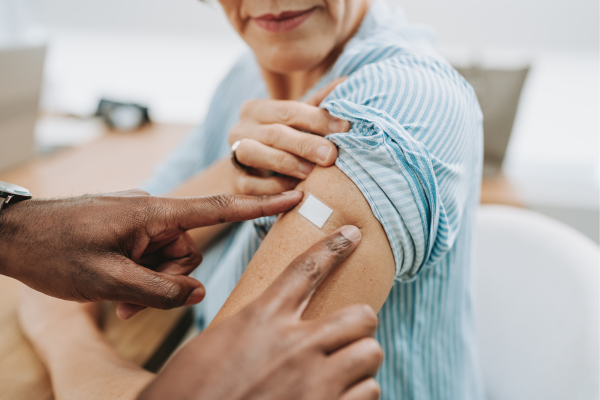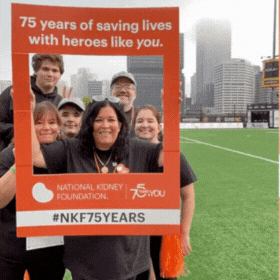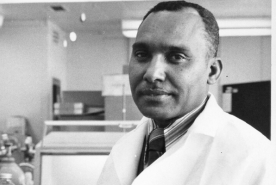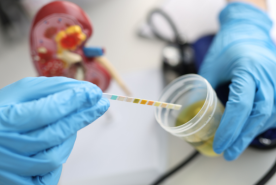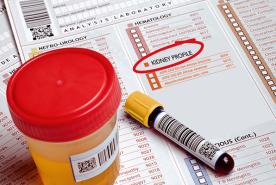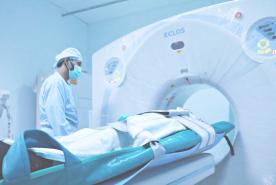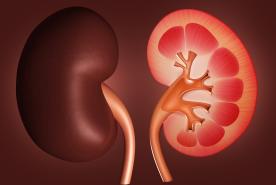November 25, 2025
Vaccines save lives, especially for people with CKD. Learn the facts, debunk common myths, and get trusted guidance from NKF.
Table of Contents
- The Truth Behind Vaccine Safety
- What is a Vaccine?
- Types of Vaccines
- Why Vaccines are Important for People With CKD
- 5 Common Myths About Vaccines
- Myth 1: Vaccines aren't safe
- Myth 2: Vaccines change your DNA
- Myth 3: I don't need vaccines if I'm healthy
- Myth 4: Vaccines cause the disease they're meant to prevent
- Myth 5: I've had the disease before, so I don't need the vaccine
- Talk to Your Healthcare Team
The Truth Behind Vaccine Safety
According to a 2024 World Health Organization study, vaccines have saved more than 154 million lives worldwide from over 20 life-threatening diseases in the last 50 years. Despite this, many myths currently surround vaccines and their safety.
NKF is here to cut through the noise by sharing the facts and explaining why staying up to date on vaccines is especially important for people living with kidney disease.
What is a Vaccine?
A vaccine is a type of medicine that contains a small, harmless part of a virus or bacteria to help the body recognize and better fight the infection.
"The main purpose of vaccines is to give the body a safe head start on creating antibodies against a virus or bacteria that could make you sick later," said Dr. Werbel, a physician-scientist specializing in infectious disease.
Vaccines do not give you the disease. They prepare the body to protect itself safely.
Types of Vaccines
There are several types of vaccines. Each works a little differently to help your body recognize and fight infections:
- mRNA vaccines: These vaccines give your body a blueprint for a small piece of a virus. Your immune system learns to recognize it and respond if you encounter the real virus later.
- Inactivated or killed vaccines: These contain a part of a dead virus or bacteria, so they cannot make you sick.
- Live attenuated vaccines: These use a weakened form of the virus or bacteria that don't cause illness in healthy people while teaching the immune system how to respond. They are generally not recommended for use in people with compromised immune systems.
- Protein subunit or viral vector vaccines: These provide a harmless piece of the virus (like a protein) to deliver instructions so your immune system can recognize the threat.
Your kidney care team will explain which vaccines you should receive and when you should receive them.
Join the NKF Blog Newsletter
Get Support, Delivered Monthly
Get monthly inspirational stories, practical insights, and expert advice to manage your kidney health at any stage.
Why Vaccines are Important for People With CKD
Kidney disease can weaken the immune system. That means common infections, like flu or COVID-19, can hit harder and lead to more serious complications. Vaccines help lower your risk of getting sick and protect your kidney health.
Vaccines are also especially important after a kidney transplant. The medicines that protect your new kidney also weaken your immune system, making it harder to fight off infections. Vaccines act as an extra layer of defense to keep you healthy and protect your transplant.
Get the recommended vaccine list for people with kidney disease.
Myth 1: Vaccines aren't safe
Some may worry that vaccines aren't safe, but vaccines are among the best-studied and safest medicines available.
"Vaccines are extremely rigorously studied for years and in millions of people," explained Dr. Werbel. "Vaccines are better studied than most of the prescription medicines people take every day."
Getting vaccinated also won't interfere with kidney medicines or dialysis. If necessary, your healthcare team may adjust the timing or type of vaccine.
Myth 2: Vaccines change your DNA
One of the biggest myths about mRNA vaccines is that they can enter your cells and change your DNA.
"mRNA vaccines do not change DNA," explained Dr. Werbel. "mRNA vaccines are a blueprint for a small piece of a virus, not the whole virus and not something that can make you sick."
This blueprint stays in a separate part of your cells and is short-lived. It triggers a small immune "alarm" that helps your body fight infections more effectively.
Myth 3: I don't need vaccines if I'm healthy
For people with kidney disease or a kidney transplant, vaccines can prevent serious illness, hospitalization, or complications from infections like flu or COVID-19.
"Vaccines aren't just about keeping yourself safe. They help protect your family, friends, and community, too," said Dr. Werbel. "We recommend that the friends and family of people with CKD get vaccinated to help protect their loved ones."
Myth 4: Vaccines cause the disease they're meant to prevent
You may feel a little sick or sore after a vaccination. But this does not mean you now have the illness you're trying to prevent. This is your immune system hard at work getting its practice.
"These side effects can be annoying," said Dr. "But they are short-lived and much milder than the disease itself."
Myth 5: I've had the disease before, so I don't need the vaccine
Vaccines strengthen your immune system and help prevent reinfection or more severe illness, even if you've already had an infection.
"Having had the disease doesn't give you perfect immunity," said Dr. Werbel. "That's why you need vaccine boosters. The body needs periodic reminders."
Talk to Your Healthcare Team
Vaccines are an essential part of staying healthy, especially for people with chronic kidney disease or a kidney transplant. The best way to protect yourself is to talk with your doctor or kidney care team about which vaccines are right for you and when you should receive them.
For more information and resources, visit:
- Vaccine Integrity Project
- IDSA Immunization Resources
- Emerging Pathogens of Concern in Immunocompromised Persons (EPOC) Study.
Have more questions? Get answers from a trained professional with NKF Cares. Call our toll-free number at 855.653.2273 or send a message.
